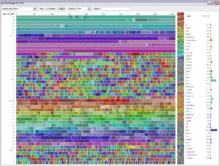 fig.1
fig.1
A data visualization created by IBM shows that big data such as Wikipedia edits by bot Pearle are more meaningful when enhanced with colors and position.
 fig.1
fig.1
A data visualization created by IBM shows that big data such as Wikipedia edits by bot Pearle are more meaningful when enhanced with colors and position.
During the past 25 years or more Medicare and private insurers have gathered data on diagnosis codes,, reimbursement patterns and demographics for providers and patients. Gradually the amount of data has increased enormously.
Now with the implementation of electronic medical records and health information exchanges the collection and retrieval of clinical information will explode.
From Google Plus comes this information on BIG DATA. This is a new term which seems to be #trending in Health IT the past month.
The term is not confined to Health IT, and appears now in social media circles, including Google Plus.
Big Data can be defined….Wikipedia:
“In information technology, big data[1] consists of data sets that grow so large that they become awkward to work with using on-hand database management tools. Difficulties include capture, storage,[2] search, sharing, analytics,[3] and visualizing. This trend continues because of the benefits of working with larger and larger data sets allowing analysts to “spot business trends, prevent diseases, combat crime.”[4] Though a moving target, current limits are on the order of petabytes, exabytes and zettabytes of data.[5] Scientists regularly encounter this problem in meteorology, genomics,[6] connectomics, complex physics simulations,[7] biological and environmental research,[8] Internet search, finance and business informatics.”
While common knowledge in IT circles among health providers it is important to recognize the world’s technological per capita capacity to store information has roughly doubled every 40 months since the 1980s (about every 3 years)[11] and every day 2.5 quintillion bytes of data are created.[12]
This can also be assumed to have taken place in HIT.
Big Data has been around for a long time…at the IRS, Census results, NASA, NOAA, and others. The CIA probably has ‘Mega Data” when it comes to Big Files.I
Health Information Technology now offers a fertile ground for ‘Big Data’.
One current feature of big data is the difficulty working with it using relational databases and desktop statistics/visualization packages, requiring instead “massively parallel software running on tens, hundreds, or even thousands of servers”.[13] The size of “big data” varies depending on the capabilities of the organization managing the set. “For some organizations, facing hundreds of gigabytes of data for the first time may trigger a need to reconsider data management options. For others, it may take tens or hundreds of terabytes before data size becomes a significant consideration.”[14]
The standard display of tables with contents and rows of data do not properly represent results, and it may require A data visualization created by IBM shows that big data such as Wikipedia edits by bot Pearle are more meaningful when enhanced with colors and position. (figure 1)
Providers must be aware of how the information their EMR contributes to the pool of data, how it will be extracted and manipulated to make public health decisions, create treatment paradigms, and develop outcome studies. Insurers and public entities are very interested in these numbers.. Incentivization by government funding for EMR reinforces the need of government and health planners to have accurate information.
Now for Chapter 2, in addition to Big Data we have:
Massively Coordinated Care

By Ian Morrison
May 01, 2012
Author, consultant and futurist based in Menlo Park, Calif. He is also a regular contributor to H&HN Daily and a member of Speakers Express.
“Big data and new thinking can transform the care of heavy users. In health care we are throwing off big data as we increasingly digitize the health care system. One analyst estimated that in 2011 alone, health care would generate 150 exabytes of information (by my calculation that is equivalent to 6 million times all the published works in the Library of Congress). “
Big IT Vendors stand to reap significant rewards:
“Global consulting players and industry gurus such as McKinsey and IBM are talking up big data, big time. McKinsey, for example, estimated that big data could create $300 billion in value by reducing health care spending by 8 percent. They argued that big data adds value to industries by:
- making information transparent and usable more quickly;
- enabling better performance measurement through digital capture;
- allowing finer grain segmentation;
- improving business analytics and decision support;
- enabling new products and services.
All of these changes are plausible in health care, and we should welcome them, particularly if they are applied to the challenge of predicting, analyzing, segmenting, treating and coordinating the care of the heavy users of health care.
Big data and the processing power of massive computers like IBM’s Watsoncan help sort through tough analytical problems and provide guidance and support, maybe even replicating at scale and at speed the really tough work of clinical decision-making “
Accountable Care Organizations will catalyze development of new software and data analysis . All of this explained further by “Six Key Technologies to Support Accountable Care





